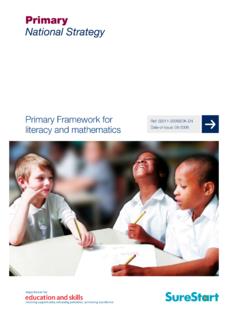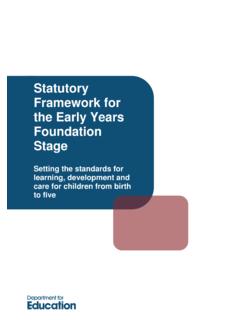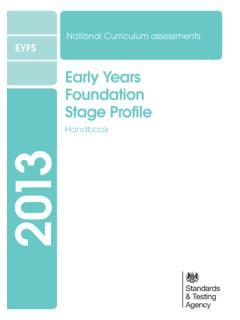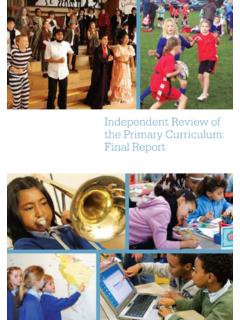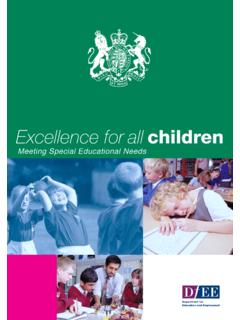Transcription of Learning behaviour
1 Learning behaviourThe Report of The Practitioners Group on School behaviour and DisciplineChair: Sir Alan SteerLearning behaviour The Report of the Practitioners Group on School behaviour and Discipline Chair: Sir Alan Steer 1 Our Core Beliefs The report which follows is based on a series of six core beliefs, to which the Group collectively subscribes: xThe quality of Learning , teaching and behaviour in schools are inseparable issues, and the responsibility of all staff; xPoor behaviour cannot be tolerated as it is a denial of the right of pupils to learn and teachers to teach. To enable Learning to take place preventative action is the most effective, but where this fails, schools must have clear, firm and intelligent strategies in place to help pupils manage their behaviour ;xThere is no single solution to the problem of poor behaviour , but all schools have the potential to raise standards if they are consistent in implementing good practice in Learning , teaching and behaviour management; xRespect has to be given in order to be received.
2 Parents and carers, pupils and teachers all need to operate in a culture of mutual regard;xThe support of parents is essential for the maintenance of good behaviour . Parents and schools each need to have a clear understanding of their rights and responsibilities; xSchool leaders have a critical role in establishing high standards of Learning , teaching and Hon. Jacqui Smith MP Minister of State for Schools and 14-19 Learners Department for Education and SkillsSanctuary Buildings Great Smith Street London SW1P 3BT October 2005 Learning BehaviourOn behalf of the Practitioner Group on School behaviour and Discipline, I am pleased to submit this report on pupil behaviour and school discipline. I trust that the report, and itsrecommendations, will be seen as assisting in the continued progress of our schools and our children and young have focussed on identifying practical suggestions relating to our terms of referenceand drawing on our experiences as Heads and teachers currently working in schools.
3 One major section of our report offers advice to our fellow practitioners on the kinds of practical approaches which can work in schools. Other sections of the report offer policy recommendations that for consideration by the Ministerial Stakeholder Group on Behaviourand Attendance. We wish our report to be seen as being both optimistic and aspirational in tone. This is reflected in a set of Core Beliefs to which, as a Group, we collectivelysubscribe and on which the report which follows is grounded. Since commencing our work in June we have been greatly supported by the manyexcellent submissions, and oral evidence, both from inside and outside the education world. We have drawn upon this expertise in arriving at our conclusions and I would like to record my gratitude to all those contributors.
4 As Chair I have enjoyed the good fortune to have an excellent group of practitioner colleagues, including representatives of the six main teacher professional associations and others with a particular track-record in improving pupil behaviour . We have all benefited greatly from the support of a very able secretariat. Sir Alan Steer Chair: Practitioners Group34 ContentsCore Beliefs2 Foreword3 SECTION 1 Introduction 5 SECTION 2 Principles and Practice What Works in Schools 10 Consistent Approaches 12 School Leadership 14 Classroom Management, Learning and Teaching 16 Rewards and Sanctions 18 behaviour Strategies and the Teaching of Good Behaviour19 Staff development and Support 21 Pupil Support Systems 22 Liaison with Parents and Other Agencies 24 Managing Pupil Transition 26 Organisation and Facilities 27 SECTION 3 Existing Initiatives on behaviour 29 Spreading Good Practice34 Training in Improving behaviour 38 Diet.
5 Sport and the Wider Curriculum 42 Exclusions and Alternative Provision 47 Schools Working in Collaboration 57 Parents60 Support and Guidance for Pupils and Parents 67 School Building Design 76 New Powers79 Annex A Membership of the Group 84 Annex B Letter from the Prime Minister 86 Annex C Glossary of Acronyms 88 Annex D List of Policy Recommendations 895 Section 1: Introduction The Nature of the Issue 1. Our experience as teachers, supported by evidence from Ofsted1, is that the great majority of pupils work hard and behave well, and that most schools successfully manage behaviour to create an environment in which learners feel valued, cared for and safe. It is often the case that for pupils, school is a calm place in a disorderly world. We realise that this is not the case in every school, but in our experience, where unsatisfactory behaviour does occur, in the vast majority of cases it involves low level disruption in lessons.
6 Incidents of serious misbehaviour, and especially acts of extreme violence remain exceptionally rare and are carried out by a very small proportion of pupils. 2. In the minority of schools where misbehaviour is more widespread, it is often true that there are failures in other areas too, and that the schools have been deemed by Ofsted to have Serious Weaknesses or to require Special Measures However, even for the most well managed schools, pockets of disruptive behaviour can cause problems. The main issue for teachers and for pupils is the effect of frequent, low level disruption. This has a wearing effect on staff, interrupts Learning and creates a climate in which it is easier for more serious incidents to occur. The most common forms of misbehaviour are incessant chatter, calling out, inattention and other forms of nuisance that irritate staff and interrupt Learning .
7 Ofsted,The Annual Report of HM s Chief Inspector of Schools 2003/2004, (February 2005)4. Ofsted identify that in some schools there are concerns regarding behaviour at Key Stages 3 and 4. However the Group is mindful that learnt poor behaviour becomes manifest early on in pupils school careers. If not managed effectively, this can lead to pupils either excluding themselves or being excluded from school. 5. The core message of the 1989 report of the Committee of Enquiry into Discipline in Schools chaired by Lord Elton, about the need for a coherent whole school approach to promoting behaviour that is based on good relationships between all members of the school community, still holds true. Nevertheless, whilst the overall principles of good practice are well established, it is clear that not all school leaders nor all school staff are effectively implementing that practice.
8 We recognise that schools now work in a very different world to that of 16 years ago. Changes in society have created new challenges. Equally, changes in technology have given rise to new opportunities, but also to new problems. We hope to deal with these in this report. The Group s Remit 6. We view the work of this Group as contributing to the implementation of Every Child Matters. The commitment that every child should have the support they need to be 1 In 2003/04, Ofsted found that behaviour in 90% of primary schools, and 68% of secondary schools was either excellent or good. Unsatisfactory behaviour was only found in 1% of primary schools and 9% of secondary schools. 2 In future, schools will have either a Notice to Improve or be placed in Special Measures.
9 6healthy, stay safe, enjoy and achieve, make a positive contribution and achieve economic well-being has our full and enthusiastic support. Throughout our work, we kept these principles very much in mind and have aimed to reflect them in the conclusions and recommendations which The Group was established to advise on how good practice found in so many schools can be spread and embedded to the benefit of others. We were also asked to consider whether anything further needed to be done by policy makers to assist teachers and schools in their task, and what more might be done to engage parents support. Our remit thus relates very much to implementation of good practice throughout We also regard the issue of behaviour and discipline as being integral to the planned development for schools over the next decade, including the introduction of extended schools.
10 The school workforce will have to adapt to these changes, and we welcome the work done by others on workforce reform. In particular, the Chair would like to thank the Workforce Agreement Monitoring Group for allowing him to meet and consult with them. 9. Our Group consisted of 13 professional practitioners (including six members nominated by the main teacher professional associations), supported by two expert advisers. A list of Group members is attached at Annex A. As school leaders and members of the teaching profession, with particular interests and experience in successfully improving pupil behaviour , we were asked to identify key practical proposals to help raise standards of behaviour and discipline. We met over a period of four months, and our remit related specifically to England.
